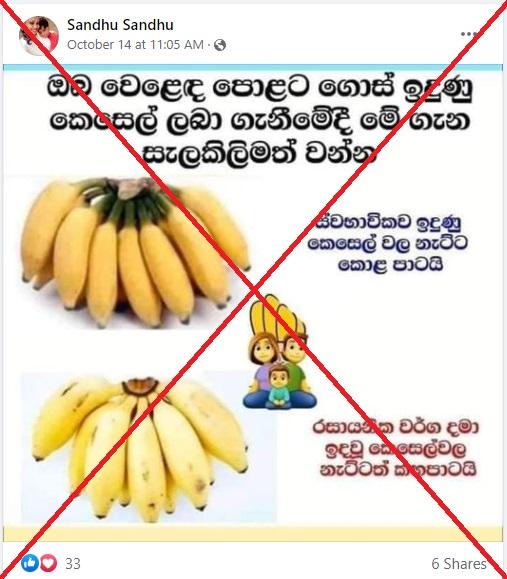
Facebook posts share misleading 'tip' to check whether bananas have been 'chemically ripened'
- This article is more than four years old.
- Published on October 30, 2021 at 05:24
- 1 min read
- By AFP Sri Lanka
"When you buy bananas from the market, make sure you pay attention to this," reads a Facebook post shared on October 14, 2021.
"The banana stalk of fruits naturally ripened will be green," the post claims. "Even the stalk of bananas ripened using chemicals will be yellow."

A similar claim has circulated in Facebook posts since at least 2020, as seen here, here and here.
The claim is misleading, experts told AFP.
Banana stalk colour
"The use of chemicals in the ripening process of bananas cannot be judged through the colour of their stalk," Ilmi Hewajulige, director of Sri Lanka's Industrial Technology Institute, told AFP on October 27.
"There is a stage in the natural ripening process of bananas as well where the entire fruit will be yellow."
Conversely, bananas that have been ripened using chemicals could have green stalks, she said.
"Among the most commonly used chemicals to ripen fruit, is ethylene. During the ripening process, if only the fruit was exposed to the chemical, the stalk would remain green despite the use of chemicals," she said.
There is no visible difference between bananas that ripen chemically or naturally, according to Dr K H Sarananda, senior lecturer at the Wayamba University Department of Biosystems Engineering.
Application of ethylene to induce ripening "does not have any detrimental impacts to human health," he said. "Any chemically ripened fruit -- including bananas -- would begin to show discernible markers only if there were irregularities in administering the chemicals.
"Bananas ripened using a banned substance such as calcium carbide would emit a foul odor. Such fruits are banned from being released to the markets."
Similar misleading claims about banana stalk colour previously circulated in Australia, as debunked by the Australian Associated Press in 2019.
Copyright © AFP 2017-2026. Any commercial use of this content requires a subscription. Click here to find out more.
Is there content that you would like AFP to fact-check? Get in touch.
Contact us
